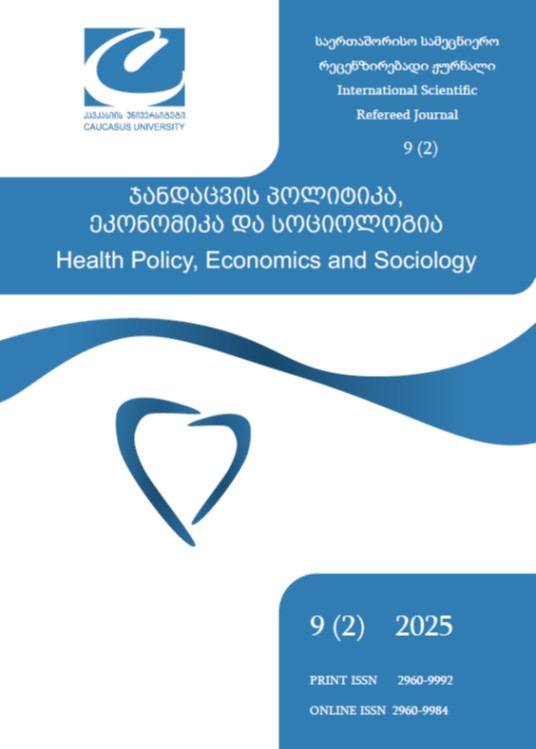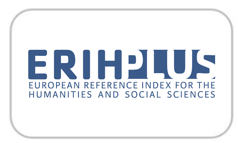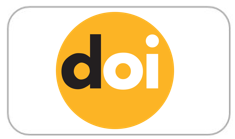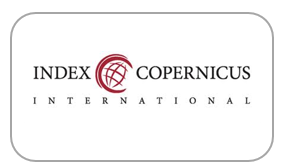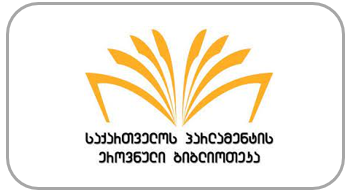სამედიცინო ინფორმაციის დაცვის ეთიკური და სამართალებრივი ასპექტები ელექტრონულ მმართველობაში
DOI:
https://doi.org/10.52340/healthecosoc.2025.09.02.15ანოტაცია
შესავალი: ჯანდაცვის სისტემის დიგიტალიზაციამ მნიშვნელოვნად გააძლიერა სამედიცინო მომსახურების ეფექტურობა, ხელმისაწვდომობა და მონაცემებზე სწრაფი წვდომა, თუმცა ამავე დროს წარმოშვა ახალი ეთიკური და სამართლებრივი გამოწვევები პაციენტების პერსონალური სამედიცინო ინფორმაციის დაცვის კუთხით. ელექტრონული მმართველობის განვითარება მოითხოვს მკაფიოდ განსაზღვრულ რეგულაციებს, რომლებიც უზრუნველყოფს კონფიდენციალურობას, ინფორმირებულ თანხმობას, კიბერუსაფრთხოებას და ჯანდაცვის სისტემის მიმართ ნდობის გაზრდას. მეთოდოლოგია: სტატიაში გამოყენებულია დოკუმენტური და სამართლებრივი ანალიზის მეთოდი, რომელიც მოიცავს: საერთაშორისო რეგულაციების (GDPR, HIPAA, 108-ე კონვენცია) შედარებით განხილვას, საქართველოს კანონმდებლობის (პერსონალური მონაცემების დაცვა, ჯანმრთელობის დაცვის შესახებ კანონი, სამედიცინო საქმიანობის შესახებ კანონი) ანალიზს, WHO, OECD და სხვა ავტორიტეტული წყაროების შეფასებებს, COVID-19 პანდემიის მაგალითზე დიგიტალიზაციის დაჩქარების ეფექტის შესწავლას. მეთოდოლოგია ემყარება ეთიკური პრინციპების (ავტონომია, სამართლიანობა, უვნებლობა, ანგარიშვალდებულება) სისტემურ შეფასებას. შედეგები: კვლევამ გამოავლინა რამდენიმე კრიტიკული საკითხი: სამედიცინო მონაცემებზე კიბერშეტევებისა და მონაცემების გამჟღავნებს მაღალი რისკი; პაციენტების არასაკმარისი ინფორმირებულობა და რთული თანხმობის ფორმები; პერსონალის არათანაბარი ციფრული უნარები და ინფრასტრუქტურული სირთულეები; საერთაშორისო სტანდარტებთან შესაბამისობის დეკლარირებული, მაგრამ არასრულად განხორციელებული პრაქტიკა; პანდემიით დაჩქარებული დიგიტალიზაცია, რომელმაც ხელი შეუწყო მომსახურების უწყვეტობას, თუმცა გაზარდა მონაცემთა დაცვის გამოწვევები; ხანდაზმულებისა და შეზღუდული შესაძლებლობის მქონე პირებისათვის ხელმისაწვდომობის პრობლემები. ობიექტური უპირატესობების მიუხედავად (ეფექტიანობა, უწყვეტობა, სწრაფი წვდომა), დიგიტალური მმართველობა მოითხოვს რისკების კომპლექსურ მართვას. დასკვნა. დიგიტალური ჯანდაცვის უსაფრთხო ფუნქციონირება დამოკიდებულია სამართლებრივი ჩარჩოს გაძლიერებაზე, კიბერუსაფრთხოების უზრუნველყოფაზე, თანხმობის გამარტივებულ და გამჭვირვალე მექანიზმებზე, პაციენტებისა და პერსონალის ციფრული განათლების ზრდაზე და საერთაშორისო სტანდარტების ინტეგრაციაზე. აუცილებელია მონაცემთა დაცვის ტექნიკური, სამართლებრივი და ეთიკური სისტემების გაძლიერება, რათა გაიზარდოს ნდობა, ხარისხი და პაციენტთა უფლებების დაცვა ელექტრონულ მმართველობაში.
წყაროები
დუღაშვილი, გ. (2022). სამედიცინო სამართლისა და მენეჯმენტის ჟურნალი, 1(2022), 125 და მომდევნო გვერდები.
ვერულავა, თ. (2018). სამედიცინო მომსახურებაზე პაციენტის ინფორმირებული თანხმობა საქართველოში. III საერთაშორისო სამეცნიერო კონფერენციის „გლობალიზაციის გამოწვევები ეკონომიკასა და ბიზნესში“ შრომების კრებული. ივანე ჯავახიშვილის სახელობის თბილისის სახელმწიფო უნივერსიტეტი. 134-139.
ვერულავა, თ. (2023). სამედიცინო მომსახურებაზე ინფორმირებული თანხმობა და პაციენტები. აკაკი წერეთლის სახელმწიფო უნივერსიტეტის მოამბე. 22 (2): 195-210.
კარტოზია, დ., რევია, ნ., ედიბერიძე, მ., შალამბერიძე, ა., ლიპარტია, თ., ფირცხალაიშვილი, ი., ახმოდიშვილი, ა. (2018). ქირურგიული ჩარევის შესახებ ინფორმირებული თანხმობა. ჯანდაცვის პოლიტიკა, ეკონომიკა და სოციოლოგია, 2. https://heconomic.cu.edu.ge/index.php/healthecosoc/article/view/6809
ნამორაძე, ე. (2024). მედიცინის სფეროში ხელოვნური ინტელექტის დანერგვა. ჯანდაცვის პოლიტიკა, ეკონომიკა და სოციოლოგია, 8(1).
საქართველოს პარლამენტი. (1995). საქართველოს კონსტიტუცია.
საქართველოს პარლამენტი. (1997). საქართველოს კანონი „ჯანმრთელობის დაცვის შესახებ“ (№29980). სსიპ სამართლებრივი აქტების ოფიციალური გამოქვეყნების სისტემა „მაცნე“.
საქართველოს პარლამენტი. (2023). საქართველოს კანონი „პერსონალურ მონაცემთა დაცვის შესახებ“ (ცვლილებები 2023). სსიპ სამართლებრივი აქტების ოფიციალური გამოქვეყნების სისტემა „მაცნე“.
საქართველოს ციფრული ეკონომიკისა და საინფორმაციო საზოგადოების განვითარების 2025–2030 წლების ეროვნული სტრატეგია. (2024).
პერსონალურ მონაცემთა დაცვის სამსახური. (2023). პერსონალურ მონაცემთა დაცვის წლიური ანგარიში.
პერსონალურ მონაცემთა დაცვის სამსახური. (2023). პერსონალურ მონაცემთა დაცვის წლიური ანგარიში 2022. სსიპ სახელმწიფო ინსპექტორის სამსახური.
პერსონალურ მონაცემთა დაცვის სამსახური. (2025). მოქალაქეთა ინფორმირებულობა მონაცემთა დამუშავების წესების შესახებ.
„პერსონალური მონაცემების ავტომატური დამუშავებისას ფიზიკური პირების დაცვის შესახებ“ კონვენცია. (2025). სსიპ „საქართველოს საკანონმდებლო მაცნე“.
„საექიმო საქმიანობის შესახებ“ საქართველოს კანონის 44-ე მუხლის 1-ლი პუნქტი. (2001). სსიპ „საქართველოს საკანონმდებლო მაცნე“.
„ჯანმრთელობის დაცვის შესახებ“ საქართველოს კანონის 30-ე მუხლი. (1997). სსიპ „საქართველოს საკანონმდებლო მაცნე“.
Beauchamp, T.L., Childress, J.F. (2019). Principles of biomedical ethics (8th ed.). Oxford University Press.
CDC. (2024, September 10). Health Insurance Portability and Accountability Act of 1996 (HIPAA). Centers for Disease Control and Prevention.
Countries in the European Region commit to disability-inclusive health systems and societies. (n.d.). World Health Organization.
Daniels, N. (2008). Just health: Meeting health needs fairly. Cambridge University Press.
Digital solutions during the pandemic. (n.d.). European Commission.
European Council. (2024, June 13). The General Data Protection Regulation. Consilium.
Gostin, L.O., Halabi, S.F. (2020). Health data and privacy in the digital era. JAMA, 323(3), 211–212.
Nuffield Council on Bioethics. (2015). The collection, linking and use of data in biomedical research and health care: Ethical issues.
OECD. (2021). OECD recommendation on health data governance. Organisation for Economic Co-operation and Development.
Weiss, E. (2025, March 13). New cybersecurity policies could protect patient health data. Health-ISAC.
Wosik, J., Fudim, M., Cameron, B., Gellad, Z. F., Cho, A., Phinney, D., Curtis, S., Roman, M., Poon, E. G., Ferranti, J., Katz, J. N., Tcheng, J. (2020). Telehealth transformation: COVID-19 and the rise of virtual care. Journal of the American Medical Informatics Association, 27(6), 957–962.
